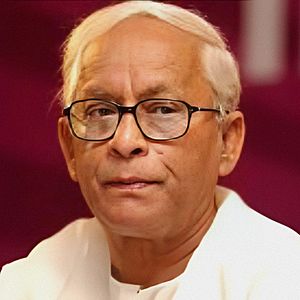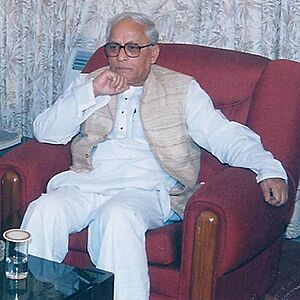Buddhadeb Bhattacharjee facts for kids
Quick facts for kids
Buddhadeb Bhattacharjee
বুদ্ধদেব ভট্টাচার্য |
|
|---|---|

Bhattacharjee in 2006
|
|
| 7th Chief Minister of West Bengal | |
| In office 6 November 2000 – 13 May 2011 |
|
| Preceded by | Jyoti Basu |
| Succeeded by | Mamata Banerjee |
| 3rd Deputy Chief Minister of West Bengal | |
| In office 12 January 1999 – 5 November 2000 |
|
| Chief Minister | Jyoti Basu |
| Preceded by | Bijoy Singh Nahar |
| Succeeded by | Vacant |
| Cabinet Minister, Government of West Bengal | |
| In office 1996 – 5 November 2000 |
|
| Chief Minister | Jyoti Basu |
| Ministry and Departments | Home and Hill Affairs |
| In office 1987–1996 |
|
| Chief Minister | Jyoti Basu |
| Ministry and Departments | Information and Culture, Urban Development, Municipal Affairs |
| In office 1977–1982 |
|
| Ministry and Departments | Information and Culture |
| Member of Legislative Assembly, West Bengal | |
| In office 1987–2011 |
|
| Preceded by | Ashok Mitra |
| Succeeded by | Manish Gupta |
| Constituency | Jadavpur |
| In office 1977–1982 |
|
| Preceded by | Prafulla Kanti Ghosh |
| Succeeded by | Prafulla Kanti Ghosh |
| Constituency | Cossipur |
| Member of Polit Bureau, Communist Party of India (Marxist) | |
| In office 2002–2015 |
|
| Personal details | |
| Born | 1 March 1944 Calcutta, Bengal Presidency, British India |
| Died | 8 August 2024 (aged 80) Kolkata, West Bengal, India |
| Political party | Communist Party of India (Marxist) |
| Relations | Sukanta Bhattacharya (uncle) |
| Residences | Palm Avenue, Kolkata |
| Alma mater | Presidency College |
Buddhadeb Bhattacharjee (Bengali: বুদ্ধদেব ভট্টাচার্য, lit. 'Buddhodeb Bhôttacharjo') (1 March 1944 – 8 August 2024) was an Indian communist politician and a member of the Politburo of the Communist Party of India (Marxist), who served as the 7th Chief Minister of West Bengal from 2000 to 2011. In a political career over 5 decades, he became one of the senior leaders of Communist Party of India (Marxist) during his regime.
Bhattacharjee was known for his relatively open policies regarding business, in contrast with the financial policies of CPI(M) being primarily anti-capitalist. But trying to do so, Bhattacharjee in his tenure as CM faced strong land acquisition protests and allegations about violence against the protesters. This led Bhattacharjee to lose the election in 2011 resulting in the fall of Left Front's 34 years of rule in West Bengal, the world's longest democratically elected communist government.
Contents
Early life
Bhattacharjee was born on 1 March 1944 in North Kolkata to a Bengali Brahmin family. His grandfather Krishnachandra Smrititirtha, who hailed from Madaripur District in present-day Bangladesh was a Sanskrit scholar, priest & a prolific writer. He had composed a priestly manual named Purohit Darpan which remains popular with Bengali Hindu priests in West Bengal. Buddhadeb's father Nepalchandra didn't enter into priesthood & was involved with the family publication, Saraswat Library, devoted to selling Hindu religious material. Poet Sukanta Bhattacharya was his father's cousin. A former student of Sailendra Sircar Vidyalaya, Bhattacharya studied Bengali literature at the Presidency College, Kolkata, and secured his B.A. degree in Bengali (Honors), and joined Adarsh Shankha Vidya Mandir school at Dum Dum as a teacher.
Personal life
He was married to Meera Bhattacharjee; they have a daughter named Suchetana Bhattacharjee (later known as Suchetan Bhattacharjee). The family has lived in a two-room apartment in Ballygunge, Kolkata. He stayed at the two-room apartment for decades and operated as Chief Minister from the same residence. Bhattacharya is renowned for his frugal lifestyle. Although belonging to a family of priests, Bhattacharjee was an avowed atheist, in accordance to the principles of communism.
Early political career
He joined the CPI(M) as a primary member in 1966. Besides taking active part in the food movement, he also supported Vietnam's cause in 1968. In 1968, he was elected state secretary of the Democratic Youth Federation, the youth wing of the CPI(M) that was later merged into the Democratic Youth Federation of India. He served in the position till 1981, when he was succeeded by Boren Basu. He was mentored by Pramod Dasgupta.
Political career
Bhattacharjee was elected to the state committee of CPI(M) in 1972 and was inducted in the state secretariat in 1982.
At first he was the MLA of Kashipur-Belgachia from 1977 to 1982. Bhattacharjee served as Minister in West Bengal Cabinet as Minister of Information and Public Relations between 1977 and 1982.
He lost the assembly elections in 1982 from Cossipur constituency in 1982 by a slender margin. He was made a permanent invitee to the central committee of CPI(M) in 1984 and was made a member in 1985.
Later he became the MLA of Jadavpur in 1987 and continued to represent the constituency till 2011. He was re-inducted in the cabinet in 1987 minister of Information and Cultural Affairs. He also held departments of Urban Development and Municipal Affairs.
He was included in the cabinet in 1991 as Information and Cultural Affairs and Urban Development and Municipal Affairs minister, however, he abruptly resigned from his position in September 1993 following differences with the chief minister on the functioning of the administration and the alleged issue of corruption & had infamously remarked that Jyoti Basu's cabinet was a council of thieves. He returned to the cabinet a few months later.
In 1996, after the 1996 West Bengal election Bhattacharjee was handed over the responsibility of home and police department, owing to the health of elderly Chief Minister Jyoti Basu. In 1999, he was made the Deputy Chief minister of West Bengal.
On November 6, 2000, he was elevated to the position of Chief Minister after Basu stepped down. In 2002, he was elected to the politburo of CPI(M).
Chief Minister of West Bengal
Bhattacharjee was elected Chief Minister of West Bengal and was sworn in a solemn ceremony at Raj Bhawan. As Chief Minister, he led the CPI(M)-led Left Front to two successive election victories in 2001 and 2006. In 2001, Left Front secured 199 out of 294 assembly seats and in 2006, it improved the tally to 235 out of 294 seats.
Bhattacharjee's tenure saw major incidents of violence like the Chhoto Angaria massacre, the Netai killings & the Dhantala case. There was also an escalation of Maoist attacks in the state, the most notable being the attack on a police camp at Silda, violence in Lalgarh & Jnaneswari Express train derailment.
He started an industrialization drive in West Bengal to bring in more investment and jobs in the states. Under his government West Bengal saw investments in IT and services sector.
Notable among them the invited projects was the world's cheapest car, Tata Nano, from a small hamlet near Kolkata called Singur. There were other proposals too, such as country's largest integrated steel plant in Salboni, West Midanpore district by Jindal group, and a chemical hub at Nayachar after it faced agrarian resistance in Nandigram.
However, his plans backfired, and his party, along with its front partners, suffered heavy losses in the 2009 Lok Sabha election. In the 2011 state assembly election he was defeated by former Chief Secretary of his own government, and the Trinamool congress candidate Manish Gupta by 16,684 votes.
He is the second West Bengal Chief Minister to lose an election from his own constituency, after Prafulla Chandra Sen in 1967. The Left Front saw a drubbing, securing just 62 seats out of 294. He resigned as Chief Minister on May 13, 2011.
Later life
Despite his calls to be relieved of party responsibilities, Bhattacharjee was retained as a member of the Politburo and the Central Committee in the 20th party congress, organised at Kozhikode in 2012.
He was relieved of his posts on the Polit Bureau and Central Committee at the 21st party congress, organised at Vishakhapatnam in 2015. The party congress elected him as a special invitee to the Central Committee. However, he was persuaded to remain a member of the state committee and the state secretariat till 2018. In 2018, due to continuing ill-health he stepped down from the state committee and the state secretariat. He was later named as a special invitee to the state committee. In 2019, he made an attempt to attend a mega-rally at Brigade Parade ground in Kolkata, however, due to breathing difficulties he could not appear on the stage and remained seated in his car.
Death
Buddhadeb Bhattacharjee died on 8 August 2024 in Kolkata after suffering from prolonged pulmonary problems.


